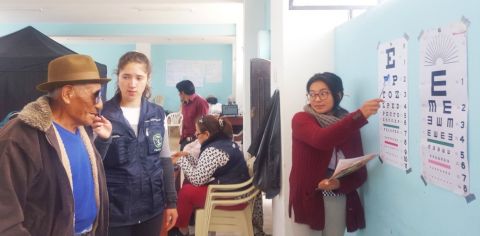
When I applied to Princeton in Latin America, I fully expected to be sent off to a remote community somewhere in Latin America. I was already preparing for exciting new foods, the embarrassing moments that naturally result from being a foreigner in a new culture, and most importantly, learning about international development at the local level.
But as was the case for many of us, COVID-19 had other plans. Would it be safe to travel? When would the situation get better? Would the fellowship happen at all? Months of uncertainty culminated in an unexpected but welcome opportunity: a remote fellowship with Partners for Andean Community Health (PACH).
PACH is a nonprofit working to improve Andean community health by empowering local partners and leveraging the expertise and resources of international volunteers. PACH works with Clínica FIBUSPAM, a nonprofit clinic in the Chimborazo Province of Ecuador, to bring high-quality affordable healthcare to populations that would otherwise lack access.
Chimborazo province, home to the largest volcano in Ecuador after which it is named, is one of the poorest provinces in the country. The indigenous population faces particular hardship, with 63% living in extreme poverty. Not only is medical care too expensive for many, but medical facilities also lack trained professionals and equipment.
Through PACH, Clínica FIBUSPAM has facilitated care to thousands of individuals, performed hundreds of surgeries with the help of international volunteer doctors, and conducted medical missions that brought medical care to remote communities.
For my PiLA fellowship, I was brought on to the PACH team to develop a monitoring and evaluation (M&E) plan, a way for the organization to track progress towards their goals and understand which activities work, which do not, and how to course correct when needed. I dove head-first into project management tools such as problem analyses, results frameworks, and logic models. Over months, and after dozens of interviews with staff, board members, and partners I built out a plan with carefully selected indicators and survey questions.
Without leaving home, I was able to speak with Ecuadorian doctors about their experiences in the community as well as with experienced board members around the world about what quality healthcare means and how to measure it. While not at the “local level,” I learned the very skills I had set out to learn when I first applied to PiLA, namely how to work towards and measure impact - the biggest international development buzzword of them all.
Through M&E, PACH and international development initiatives across the board can ensure efficient and effective use of resources and incorporate lessons learned into the decision-making process. Ultimately, this will make them not only more effective but also more impactful.
COVID-19, a stark reminder of the importance of strengthening health systems, has greatly affected the operations of PACH and Clínica FIBUSPAM. To learn more and support their work in Ecuador, click here: https://partnersforandeancommunityhealth.org/home/donate/
*Photo credit: Lucy Miller-Suchet, PiLA Fellow 2019-2020
